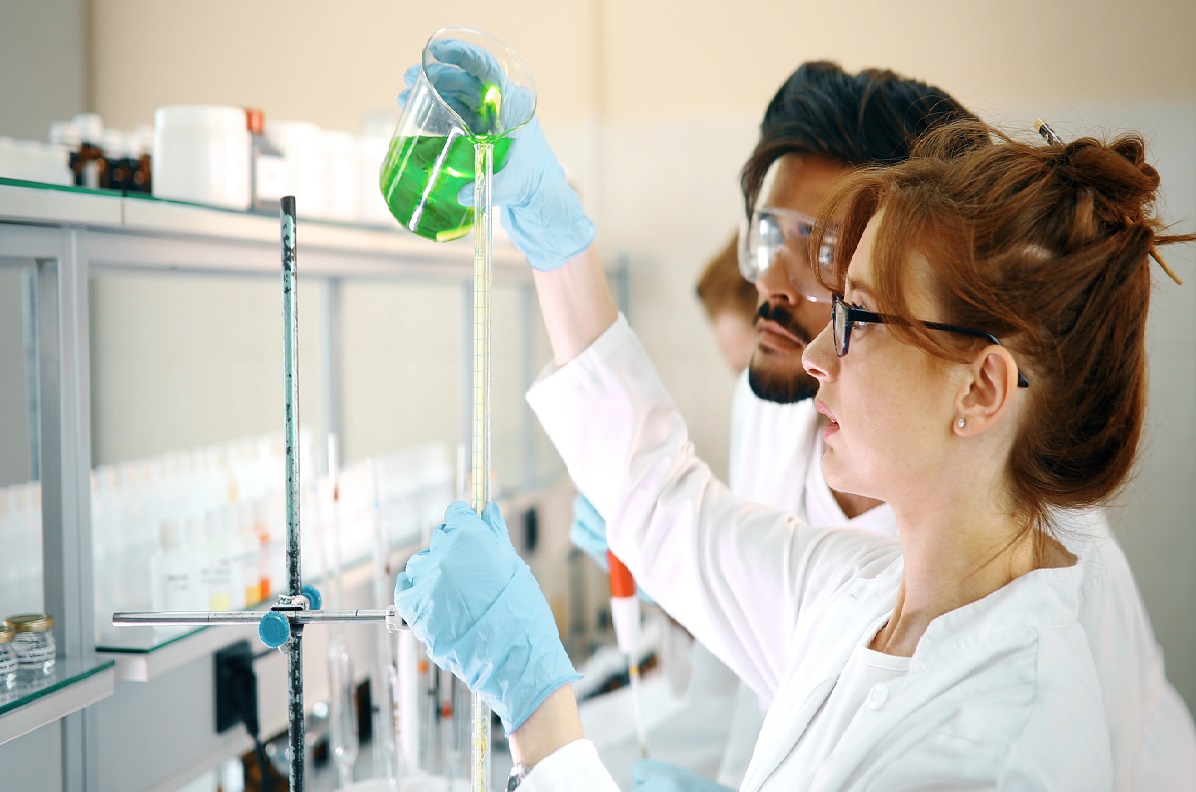Did you happen to be one of those youngsters who would linger in the chemistry lab at the school, looking at the beakers filled with various chemicals? Did you have a fascination with diverse chemical explosions and dream of this becoming your profession? Every year, thousands of students take part in different Chemistry courses both at the postgraduate and undergraduate levels. Many international universities offer top-quality degree courses in Chemistry. Before you begin the path you want to take, it is essential to be aware of every aspect associated with the subject. This blog will provide you with the most important areas of Chemistry that comprise all chemical and reactive compounds within the field.
The study of chemistry investigates the chemical reaction between different components and elements. It is one of the main areas of science that follows Physics and Biology. Everything that we see around us that occupies space and mass is called matter and is composed of tiny particles called atoms. The study of Chemistry can provide scientists with insight into the other aspects that comprise Physical Science and develop efficient analytical tools for research applications. Due to the wide-ranging range of study, the subject is organized into distinct areas of Chemistry that focus on specific chemical concepts.
1. Organic Chemistry
Organic Chemistry is one of the most significant branches of chemistry which studies chemical compounds that have carbon elements paired with carbon-hydrogen bonds (hydrocarbons). It is also known as the “Chemistry of Life” that is concerned with its structure and properties and the reaction of organic molecules. Understanding Organic Chemistry helps students determine and categorize the different organic compounds and develop one with the desired properties and uses. Students can find work in petroleum, pharmaceuticals and rubber, cosmetics, plastic detergents, agrochemicals, and coatings industries.
2. Inorganic Chemistry
Inorganic chemistry studies the properties, structure, and reactions of chemical compounds that are not carbon-based or compounds that do not have carbon-hydrogen bonds. These, in essence, can be described as one branch of Chemistry that deals with chemicals that are not organic in the natural world. The subject covers the synthesis and behavior of organometallic or inorganic chemical compounds in the Earth’s crust and non-living matter.
3. Physical Chemistry
Physical Chemistry covers the ‘physical properties of chemical compounds by using laws and concepts from Physics, including energy, motion and force, the period, statistical mechanics thermodynamics, and quantum chemistry. These are among the most exciting areas of Chemistry that helps students comprehend the physical properties of chemical compounds such as volume, temperature, conductivity, pressure plasticity, strength, the surface tension of liquids, solubility viscosity, boiling point, and melting point, and color. The subject is studied with diverse mathematical models as well as formulas.
4. Analytical Chemistry
Analytical Chemistry is one of the quantitative chemistry branches that focuses on identifying, separating, and quantifying chemical compounds. Analytical Chemistry can enable scientists and chemists to assess the number of chemical components within a particular substance. The subject is further divided into two categories:
- Qualitative Analysis involves using processes used to determine an element of chemistry in a sample.
- Quantitative Analysis. It is the process of determining the amount or concentration of the substance within the model.
5. Biochemistry
Biochemistry is the amalgamation of Biology with Organic, Physical, Inorganic, and Chemistry. It is considered one of the most significant fields that is a substantial part of Chemistry. Biochemistry studies the biochemical structure, composition, and chemical reactions on a molecular and cellular level. It covers a variety of living organisms like insects, plants, and microorganisms. Many of the topics covered in this area include subjects concerning diseases, the chemical foundations of heredity, and how living organisms obtain the energy they require from their food.
6. Environmental Chemistry
The field of environmental chemistry is an integral part of chemistry as it focuses on environmental issues. It’s an investigation of the biological processes in the natural world. The field of environmental chemistry comprises diverse subjects like the sciences of biology, maths, and toxicology to discover the best ways to develop sustainably.
7. Industrial Chemistry
Industrial Chemistry is essential for the creation of new products. Raw materials are heated and dissolved by filtration and other methods to create an entirely new product. Examples of industrial chemistry include the petrochemicals: propylene, ethylene as well as benzene, styrene, and benzene ceramics – frit, silica brick, and more.
8. Polymer Chemistry
It focuses on polymers as well as macromolecules. Polymer structures are found in organic chemistry, analytical chemistry, and physical chemistry. It is also used in nanotechnology. It can be further classified into thermoplastics, thermosets elastomers, and synthetic fibers.
9. Nuclear Chemistry
The name itself suggests that it’s an investigation into nuclear reactions. It is focused on atomic processes, radioactivity, and transformations. It is widely utilized in a variety of treatment and treatments.
10. Geochemistry
Geochemistry is a thorough study of Earth Systems and Environmental Sciences. Earth is made up of various chemical substances, and it is the science of studying all of those chemical processes. Geochemistry is essential to comprehend the minerals, weathering agents, and other aspects of the environment.
Career Prospects in Chemistry
Due to the many fields of Chemistry and the emergence of interdisciplinary specializations, there are many career options for those looking to impact the area. Look over the most popular and top jobs in Chemistry that you need to be aware of:
- Analytical Chemist
- Pharmacologist
- Geochemist
- Water Chemist
- Toxicologist
- Materials Scientist
- Chemical Engineer
- Forensic Scientist
- Hazardous Waste Chemist
- Biochemistry
Branchings of Chemistry with Exemples
You are now well-versed in the various branches of Chemistry. Let us take a look at the different departments. Let’s get the idea better by using examples:
Branches of Chemistry Branches of Chemistry Real Life Examples
Organic Chemistry Washing detergents, Plastics, Hair dyes
Inorganic Chemistry Floor cleaner, Soap
Physical Chemistry Water boiling, water freezing
Analytical Chemistry Water and Soil Testing
Biomedical Test of Kidney Function in the Chemistry Lab, blood test
Environmental Chemistry Chemicals from consumers
Industrial Chemistry Sulphuric acid from factories
polymer Chemistry synthetic fibers clothing
Nuclear Chemistry Manufacturing weapons
Geochemistry Industrial effluent as well as the sewage Sludge
Branches of Chemistry With Real-Life Examples
Chemistry is the study of how different substances alter colors, shapes, size, and even their appearance when they interact with another sense or group of substances. In addition, the application of different branches of chemistry across various disciplines has led to a myriad of discoveries and breakthroughs that have helped humanity in some or the other way. Knowing Chemistry in our daily lives is crucial because the food we consume and the cosmetics we put on or our medicines undergo chemical reactions. These can assist you in making choices about a wide variety of issues, such as watering plants according to seasons, determining the right temperature at which you can bake, deciding on the best medication for acidity, and applying the right sunscreen with a specific SPF or other. For more details, visit our blog on
Top 5 Branches of Chemistry for Masters
The world is filled with chemistry; from schooling to masters-level chemistry offers broader possibilities. Many students opt to pursue careers in the field of Chemistry or even pursue masters. Master’s degrees are an excellent opportunity to test your limits and acquire a deep understanding of the subject. Let’s look at the different areas of chemistry that Masters students can study:
- MSc Organic Chemistry
- MSc Medicinal Chemistry
- MSc Analytical Chemistry
- MSc Molecular Chemistry
- MSc Biochemistry
Major Universities for Chemistry Courses
If you’re now well-versed in the main areas of Chemistry, These are the top-ranked universities around the world that offer numerous specialized and diverse courses in Chemistry:
University QS World University Rankings 2022
- Massachusetts Institute of Technology (MIT) 1
- Harvard University 5
- University of Cambridge 3
- Stanford University 3
- University of California, Berkeley 30
- University of Oxford 2
- ETH Zurich – Swiss Federal Institute of Technology 8
- California Institute of Technology (Caltech) 6
- EPFL 14
- Nanyang Technological University, Singapore (NTU) 11
- National University of Singapore (NUS) 11
- The University of Tokyo 24
Major Colleges in India for Chemistry
If you’re looking to attend a university in India. Here’s a list of top colleges and universities that offer Chemistry as a major:
- Indian Institute of Science
- Banaras Hindu University
- Indian Institute of Technology Bombay
- Jadavpur University
- IISER Pune
- Indian Institute of Technology (IIT) – Roorkee
- Indian Institute of Technology Kharagpur
- Indian Institute of Technology Kanpur
- University of Delhi
- Indian Institute of Technology Madras
Chemistry is commonly referred to as the “Central Science ” since it provides the framework to understand science’s fundamental and applied areas. We hope this blog has helped you become acquainted with the most important areas of Chemistry. You can also talk with our specialists via Leverage Edu and get the most effective advice on choosing the right college to start your career in the area of Chemistry.



